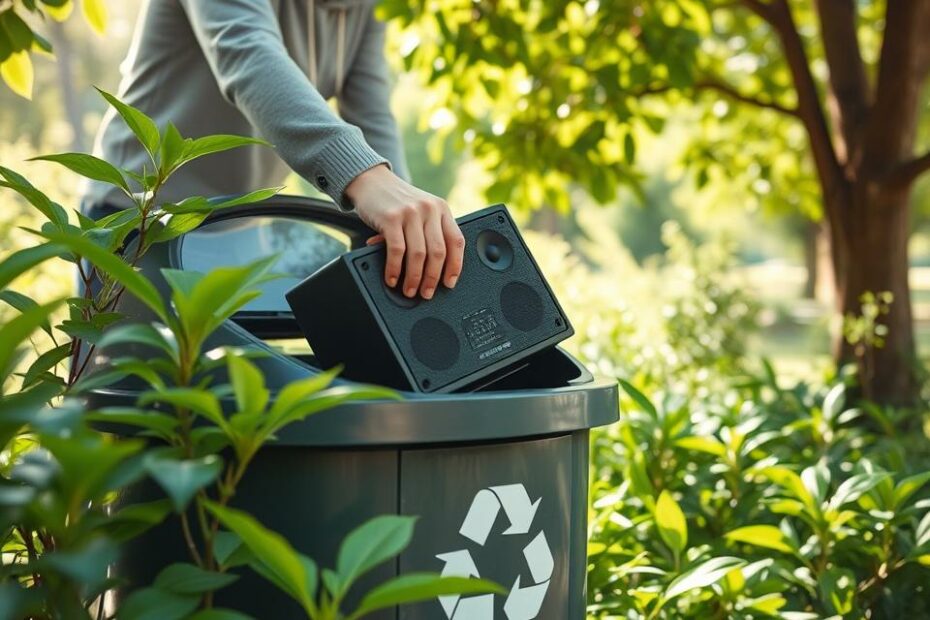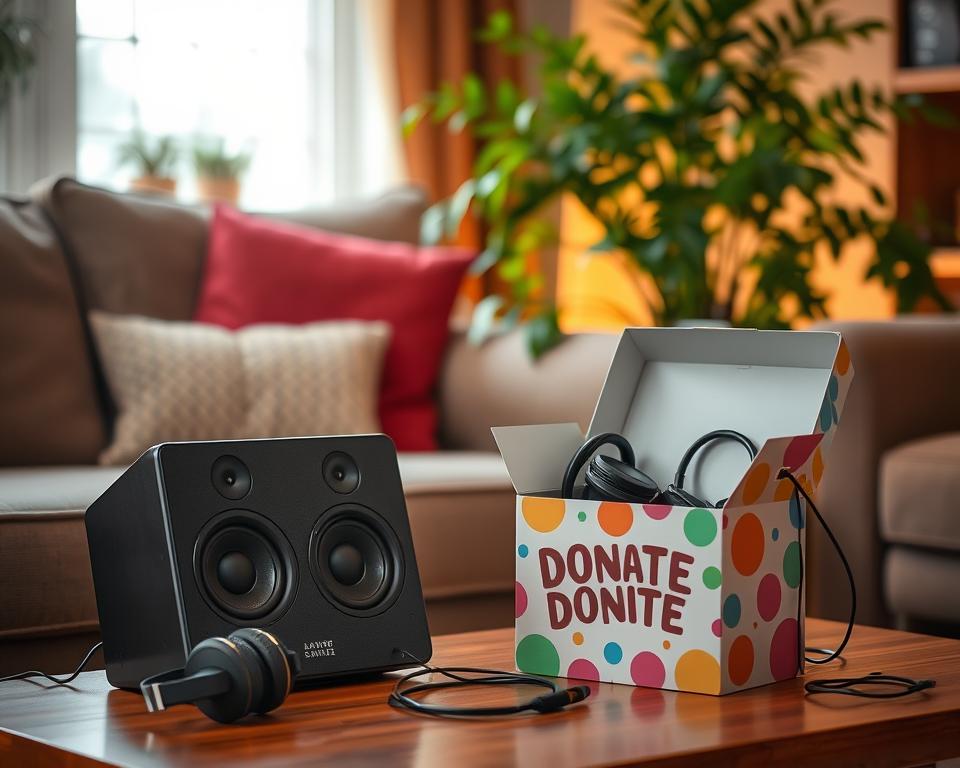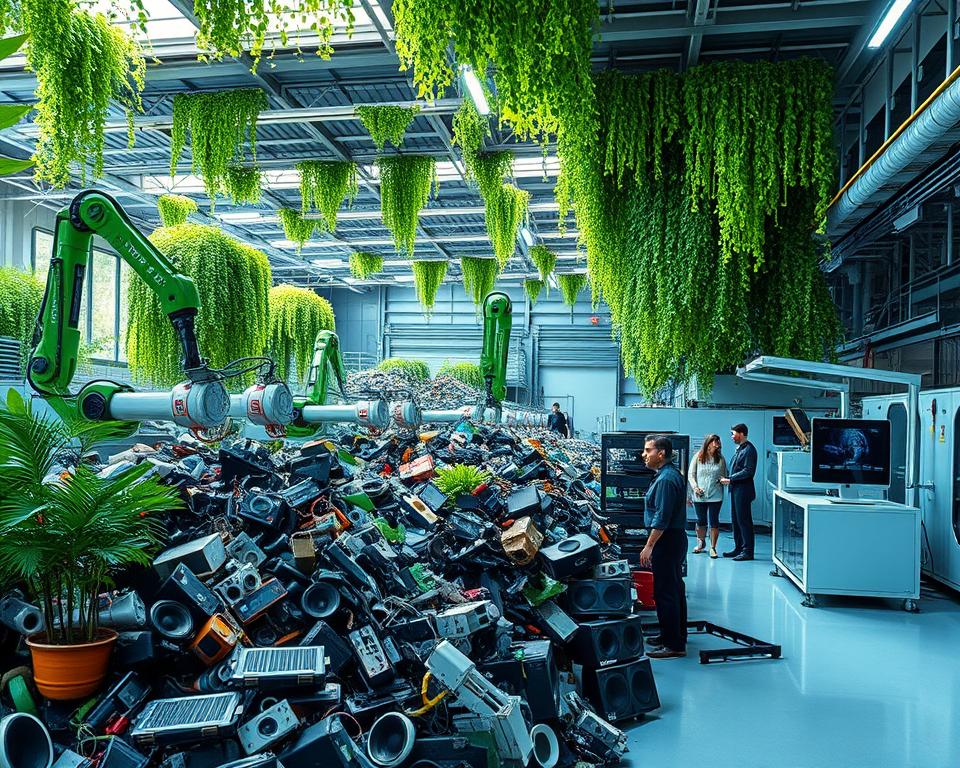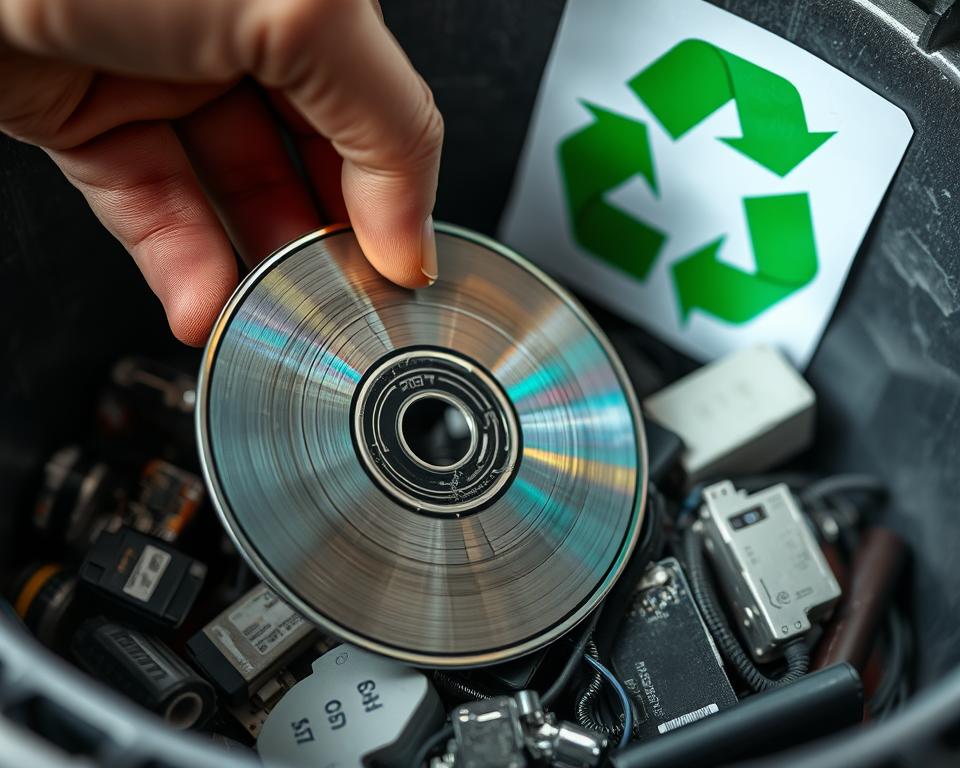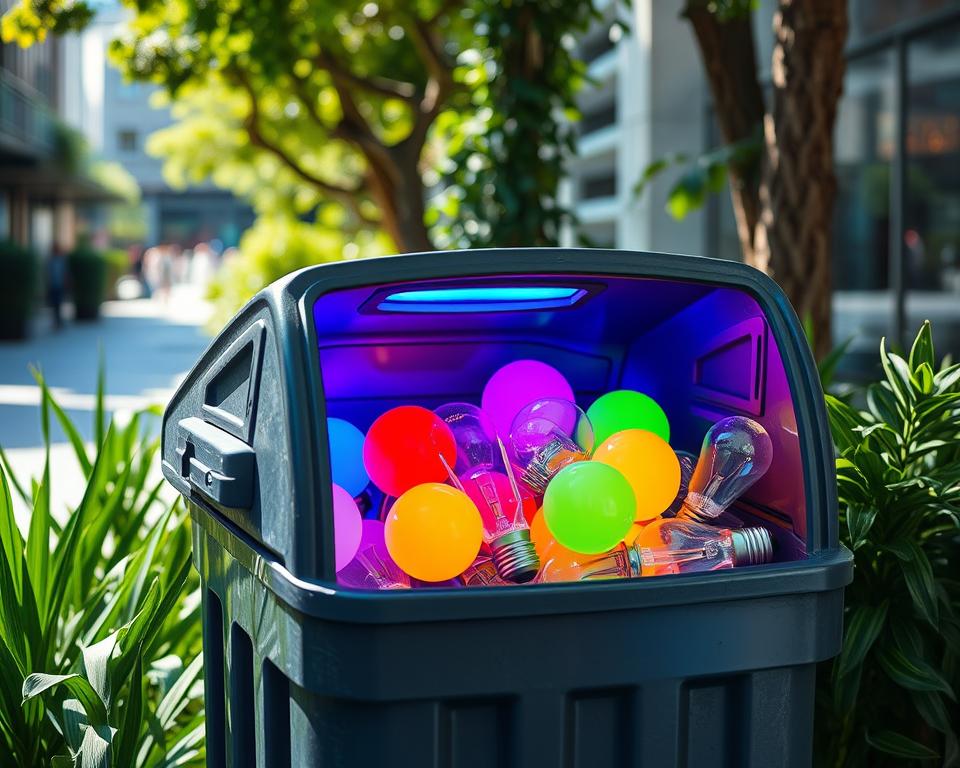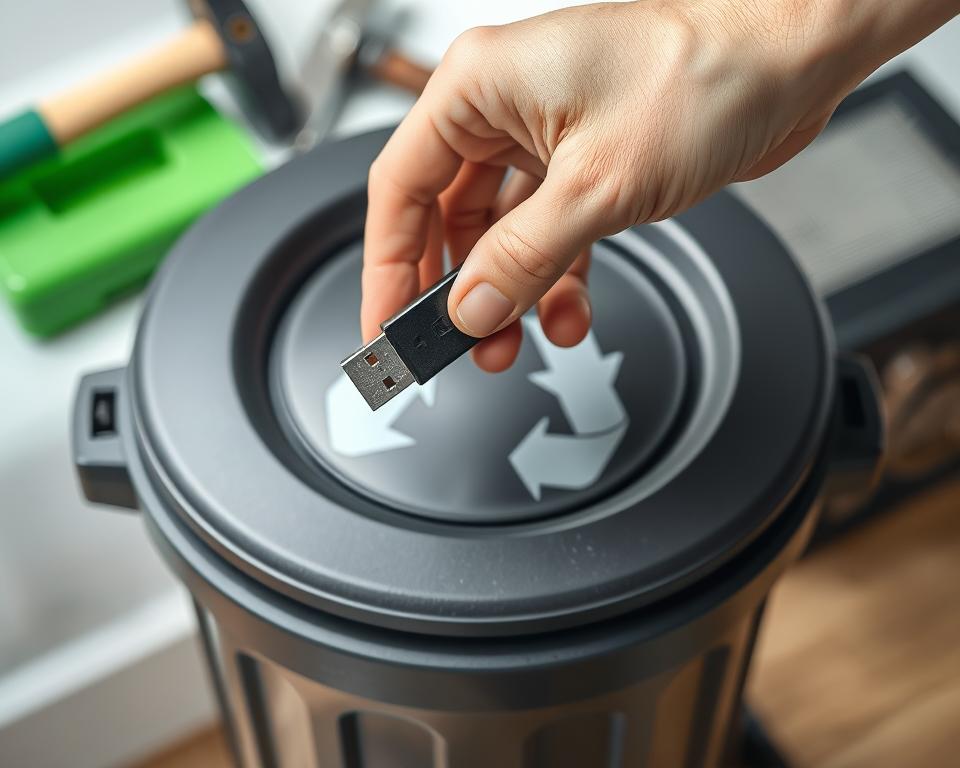Technology is changing fast, leading to more electronic waste (e-waste) in our homes and communities. Speakers, key to our entertainment, often get replaced quickly. But what happens to them, and how can we dispose of them right? This guide will show why proper speaker disposal matters and how to lessen our e-waste impact.
Key Takeaways
- E-waste, including speakers, contains hazardous materials that require specialized disposal to prevent environmental damage.
- Responsible speaker disposal involves identifying recycling and donation options in your local community.
- Reputable electronics recycling programs, such as Best Buy’s, offer convenient ways to recycle your unwanted speakers and other electronic devices.
- Donating or selling used speakers can extend their lifespan and reduce the amount of e-waste sent to landfills.
- Understanding the materials in your speakers and the recycling process can help you make informed decisions about their disposal.
Introduction to Speaker Disposal
Technology changes fast, and so does the problem of e-waste, like old speakers. These devices have harmful materials like lead, mercury, and cadmium. If not thrown away right, they can hurt our environment and health.
The Importance of Responsible E-Waste Management
Throwing away e-waste wrong can pollute our air, soil, and water. This is bad for our planet and us. We need to manage e-waste in a way that’s good for the earth and keeps us safe.
Overview of Proper Speaker Disposal Methods
There are many ways to get rid of speakers that are good for our planet:
- Donating or Selling Used Speakers: Give your old speakers to people or groups who can use them again. This cuts down on waste.
- Recycling Speaker Components: Take apart speakers and recycle their parts. This way, materials are reused instead of thrown away.
- Using Take-Back Programs: Stores like Best Buy have recycling programs. You can bring your old speakers there for safe recycling.
Choosing these green ways to get rid of speakers helps reduce waste. It also helps make our future cleaner.
What is E-Waste?
E-waste, or electronic waste, is unwanted or discarded electronic devices and parts. This includes items like smartphones, laptops, and big appliances like refrigerators and washing machines. E-waste is hazardous because it often contains toxic materials like lead, mercury, and cadmium.
Definition of E-Waste and Its Hazards
E-waste is a big problem worldwide, affecting both the environment and our health. The definition of e-waste includes any electronic device or part that’s no longer needed or works. This includes hazardous e-waste like old TVs, computers, and phones, which can harm us if not disposed of right.
Throwing away e-waste the wrong way can let harmful substances into our environment. This can pollute soil, water, and air, harming both wildlife and people.
| Electronic Waste Dangers | Environmental Impact of E-Waste |
|---|---|
|
|
As we use more electronic devices, the dangers of e-waste grow. It’s important to manage e-waste well to protect our health and the planet.
Disposing of Speakers
Getting rid of old speakers can be done in many ways. Speaker disposal helps keep equipment working longer and protects the environment. It’s all about handling electronic waste (e-waste) the right way.
One smart move is to donate or sell used speakers. This way, they get a second chance to serve someone else. Websites like eBay, Craigslist, and local groups are perfect for disposing of audio equipment the right way.
If the speakers can’t be used anymore, recycling is the next best step. Many places, including Best Buy, have recycling programs. They handle the materials like metals, plastics, and circuitry safely.
When disposing of speakers, make sure to wipe out any personal data. Deleting files isn’t enough. Use a secure method to erase data before recycling or donating.
Choosing eco-friendly speaker disposal options helps the planet. It ensures your old audio gear is dealt with in a responsible manner.
| Disposal Method | Percentage of Households |
|---|---|
| Curbside Collection | 42% |
| Hazardous Waste Facilities | 23% |
| Retailer Recycling Programs | 37% |
| E-Waste Collection Events | 56% |
| Online Resale | 24% |
| Charitable Donations | 45% |
Donating or Selling Used Speakers
When it’s time to say goodbye to your old speakers, think about donating or selling them. This way, you’re not just getting rid of them but also helping the planet. Websites like Facebook Marketplace, Craigslist, and eBay are perfect for selling your used speakers. They help you find buyers close to you and make the selling process easy.
Online Platforms for Selling Electronics
Selling your used speakers online can be a smart move. It lets you make some money and give your speakers a new life. Sites like eBay, Craigslist, and Facebook Marketplace are great for this. Just make sure to check prices, describe your speakers well, and take clear photos.
Local Organizations Accepting Speaker Donations
- Schools, community centers, and non-profits often take donations of working audio gear, like speakers. They use it in their programs or fix it up for others.
- Charities like Goodwill, the Salvation Army, and Habitat for Humanity might also accept your used speakers. They find new homes for them.
- Looking into local donation centers or electronics recyclers can help you find the best place to donate your speakers. This way, you’re helping the environment and others.
Donating or selling your used speakers is a win-win. You’re reducing waste and possibly helping someone in your community. It’s a kind and eco-friendly thing to do.
Recycling Speaker Components
It’s important to dispose of old speakers the right way for the planet. Speakers have materials like metal, plastic, and electronics that can be recycled. This helps save resources and keeps harmful substances out of the environment. The recycling process means taking apart the speaker, sorting materials, and sending them to recycling centers.
Understanding Speaker Materials and Recycling Process
To recycle speakers well, we need to know what they’re made of. Common parts include:
- Metal frames and chassis
- Plastic casings and housings
- Wiring and electronic circuits
- Magnets and coils
- Cone and suspension materials
After taking apart the speaker, we sort and send the parts to e-waste recycling centers. There, they’re processed to get valuable resources. This cuts down on electronic waste in landfills and helps make new products, supporting a green recycling process.
| Speaker Component | Recycling Process | Recovered Materials |
|---|---|---|
| Metal frames and chassis | Melting and smelting | Steel, aluminum, copper |
| Plastic casings and housings | Shredding and sorting | Polypropylene, ABS, and other plastics |
| Wiring and electronic circuits | Disassembly and separation | Copper, gold, silver, and other precious metals |
| Magnets and coils | Magnetic separation | Neodymium, ferrite, and other rare earth metals |
| Cone and suspension materials | Recycling and reuse | Reused in new speaker production |
Recycling speakers and other electronics helps the environment. It’s a key step towards a greener future. Let’s all do our part in speaker recycling for a better planet.
Best Buy’s Electronics Recycling Program
Best Buy is a leader in electronics recycling. They make it easy for people to recycle their old speakers and devices. This helps tackle the big problem of electronic waste.
Best Buy takes many electronics, like speakers, TVs, and phones. You can bring up to three items per day to any Best Buy store for free. This makes recycling easy for many people.
For bigger items, like TVs, Best Buy offers a haul-away service for a small fee. This service helps keep big electronics out of landfills.
Best Buy’s recycling is good for the planet and helps manage e-waste better. They work with recyclers who handle items safely. This means harmful stuff like mercury is removed properly.
Best Buy’s recycling efforts are a big help in fighting e-waste. Customers can be sure their old electronics are recycled right. This helps the environment and supports a sustainable future.
Local Electronics Recycling Options
There are local options for recycling electronics besides national programs. Using these neighborhood recycling centers is a great way to recycle your used speakers and other devices. This ensures they are disposed of in an eco-friendly way.
Finding Responsible E-Waste Recyclers Near You
Finding the right e-waste recyclers is key for electronics recycling. Many places, like municipalities and community groups, have recycling centers and events. These make environmentally-friendly disposal easy to access. Here’s how to find local e-waste recyclers near you:
- Check your city or county government website for local e-waste recycling info and locations.
- Search for community-led electronics recycling efforts by nonprofits or environmental groups.
- Look for recycling center events or collection drives in your area.
- Use online directories or search tools to find responsible e-waste recyclers near you.
When picking local e-waste recyclers, choose ones that follow environmental rules. They should handle hazardous materials safely. This way, your old electronics are recycled properly.
| Recycling Program | Acceptable Items | Fees/Incentives |
|---|---|---|
| Covered Electronic Waste Recycling Program (California) | Computers, monitors, TVs, printers, and more | $10 fee on certain electronic devices sold in California since 2005 |
| Zero Waste Sonoma E-Waste Collection Events | Laptops, smartphones, microwaves, and other electronics | Free drop-off at designated collection sites |
| Staples Rewards | HP, Lexmark, or Dell ink/toner cartridges | $2 Staples Reward for each qualified cartridge returned |
The Future of E-Waste Management
Electronic devices are changing fast, making e-waste management harder. We need better ways to dispose of old electronics. This is because old devices harm our environment.
Initiatives and Policies for Sustainable Disposal
New plans are being made to tackle the e-waste problem. The Extended Producer Responsibility (EPR) makes companies responsible for their products’ disposal. This helps make electronics more eco-friendly and improves how we manage e-waste.
There’s also a push for better recycling systems. This includes new tech for sorting materials and better ways to collect and process e-waste.
Lawmakers are working on ways to encourage people to recycle electronics. This includes labeling products, offering repair help, and teaching people about recycling. These steps help people make better choices and join the circular economy.
| E-Waste Management Trends | Key Initiatives and Policies |
|---|---|
| Increasing complexity of the e-waste stream | Extended Producer Responsibility (EPR) |
| Growing demand for sustainable disposal practices | Improved recycling infrastructure |
| Need for enhanced consumer awareness | Sustainable electronics disposal policies |
As we move forward, these efforts will be key. They will help create a greener way to deal with electronic waste.
Reducing Your E-Waste Footprint
In today’s world of fast-changing electronics, it’s key to think about our impact on e-waste. There are steps we can take to reduce our e-waste footprint and help the planet. These actions lead to a more sustainable future.
One big step is making informed purchasing decisions. Before buying the newest gadget, check if your current one still works for you. Keeping our devices longer cuts down on e-waste. It also minimizes electronics waste and supports eco-friendly electronics use.
Another good way to cut down on e-waste is by proper maintenance and repair of our gadgets. Clean them regularly, update software, and get professional help when needed. This extends product lifespan and reduces the need for early replacements.
- Look for chances to reuse or repurpose old electronics. You can donate them or sell them online.
- Find and use manufacturer takeback programs for recycling used electronics responsibly.
- Support companies and projects that focus on sustainable e-waste management and eco-friendly electronics use.
By making small, thoughtful choices every day, we can all reduce our e-waste footprint. Together, we can make the future of electronics greener and more sustainable.
Conclusion
Getting rid of old speakers and electronics the right way is key to protecting our planet. We can donate, sell, recycle, or use take-back programs to do this. It’s a team effort to tackle the growing problem of electronic waste.
Statistics show why we must dispose of speakers and electronics carefully. In 2019, we threw away 59 million U.S. tons of e-waste, a 21% jump from five years before. That’s as heavy as 350 Queen Mary 2 ocean liners. And, by 2030, we expect to have 74 metric tons of e-waste, almost doubling in 16 years.
By following the advice in this article, we can all help reduce e-waste’s harm. We’ve learned about the importance of managing e-waste well, the different ways to dispose of it, and the need for everyone to act together. Let’s make sure our electronic devices, like speakers, are recycled and disposed of properly.
FAQ
What are the proper ways to dispose of old or unwanted speakers?
You can donate, sell, recycle, or use take-back programs. Best Buy offers such programs.
Can I sell my used speakers online?
Yes, you can sell them on Facebook Marketplace, Craigslist, and eBay. This way, they can still be useful.
Where can I donate my old speakers?
Schools, non-profits, and charities might accept them. They can be reused or refurbished.
How can I recycle my speakers?
Take them apart and separate the materials. Then, send them to recycling facilities for reuse.
Does Best Buy offer an electronics recycling program?
Yes, Best Buy has a program for recycling electronics. They accept many items, including speakers.
How can I find local electronics recycling options?
Look for local options like municipal drop-off sites or community events. Best Buy also has a program.
What are some initiatives to improve e-waste management?
Extended producer responsibility and better recycling infrastructure are key. They aim to improve e-waste management.
How can I reduce my e-waste footprint?
Buy wisely, fix your devices, and reuse or repurpose old ones. Recycling is also important.
